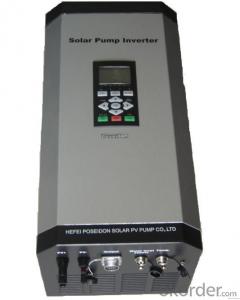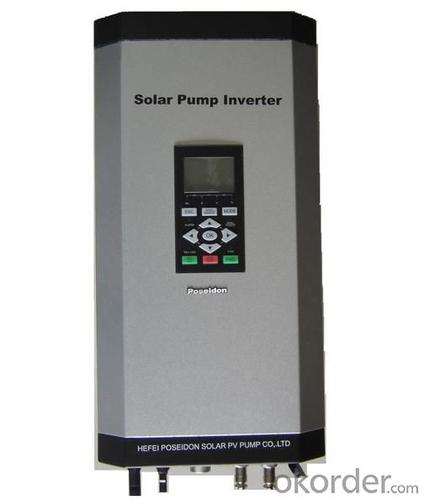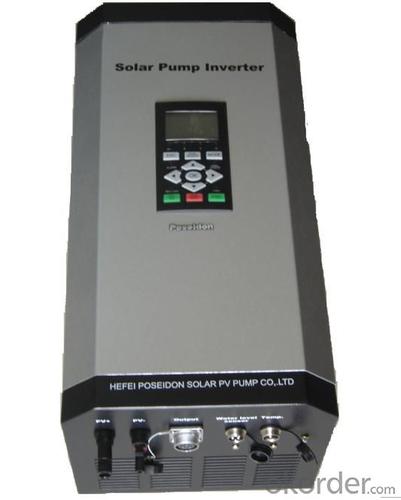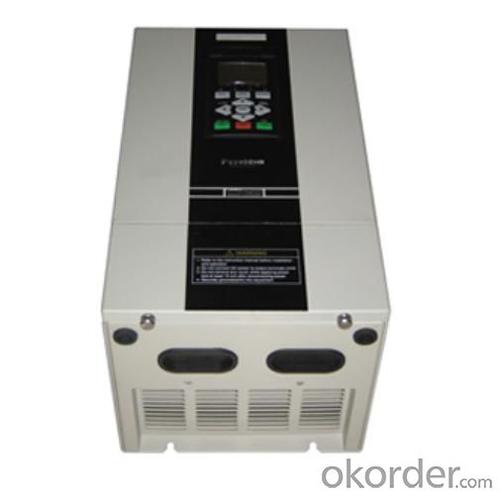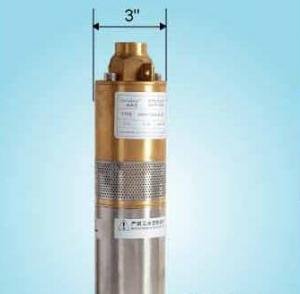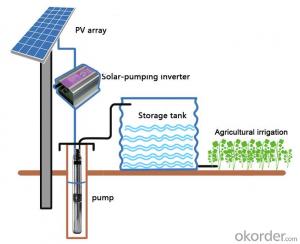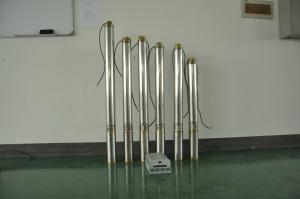Solar Pump With Backup Battery FCPM7K5H
- Loading Port:
- China Main Port
- Payment Terms:
- TT OR LC
- Min Order Qty:
- -
- Supply Capability:
- -
OKorder Service Pledge
Quality Product, Order Online Tracking, Timely Delivery
OKorder Financial Service
Credit Rating, Credit Services, Credit Purchasing
You Might Also Like
Solar pump inverter FCPM7K5H Product Description:
Product Description:
Solar water pumping system is constructed with solar panel array,solar pump inverter and AC water pump, DC current produced from solar panel will be delivered to solar pump inverter,and it will convert it into AC current to drive water pump,and will automatically regulate output frequency according to sun radiance intensity,maximally realize MPPT tracking function.
Product Features
Adopting the proposed dynamic VI maximum power point tracking (MPPT) control method, with fast response, and reliable operation, achieves efficiency of 99%.
Designed with variable frequency driver, greatly improves efficiency
Extremely high efficiency
Digital mode control, with automatic operation and manual operation mode options
Complete protection functions
Adopts intelligent IPM module, with high reliability
LCD display and operation panel, in real time presents operating data
Optional for water level measurement and control circuit
Applicable for general ACC pumps, like centrifugal pump, piston pump etc.
Independent intellectual property; Highly effective, the redundant reliability, exempts the maintenance and the long life.
The pumps are soft started, fully protected.
No batteries are used. So better Sunlight, more water
Datasheet.
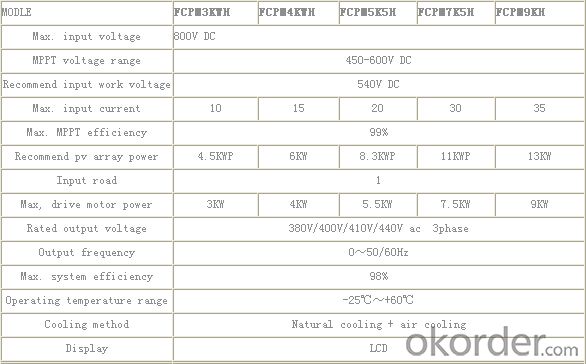
- Q: How do solar pumps handle water with high bacterial or microbial content?
- Solar pumps do not have a direct mechanism to handle water with high bacterial or microbial content. However, solar-powered water pumps can be integrated with additional water treatment systems, such as filters or chlorinators, to address the issue of high bacterial or microbial content in water. These systems can effectively remove or disinfect the bacteria or microbes, ensuring safer water for various applications.
- Q: Can a solar pump be used for water supply in residential communities or housing complexes?
- Yes, a solar pump can be used for water supply in residential communities or housing complexes. Solar pumps utilize energy from the sun to pump water, making them an environmentally friendly and cost-effective solution for providing water in areas with no access to electricity. They can be used to pump water for various purposes such as drinking, irrigation, and household use, making them suitable for residential communities or housing complexes.
- Q: How does a solar pump handle water with high levels of total dissolved solids?
- A solar pump can handle water with high levels of total dissolved solids (TDS) by using filtration and desalination techniques. The pump usually incorporates a pre-filter system to remove larger particles, and then passes the water through a reverse osmosis or distillation process to remove the dissolved solids. This ensures that the water pumped by the solar pump is of acceptable quality for various applications, even when dealing with high TDS levels.
- Q: On the issue of pumps and solar panels
- Pump flow and head is inversely proportional to the high flow will become smaller head. And vice versa. 30M of the wells should use at least 750W inch of the pump.
- Q: Can solar pumps be used to create a water feature in a garden?
- Yes, solar pumps can be used to create a water feature in a garden. Solar pumps are an environmentally friendly option that use solar energy to power the pump, eliminating the need for electricity or batteries. They can be used to create fountains, waterfalls, or other water features, adding an attractive and soothing element to any garden while minimizing energy consumption.
- Q: What is the lifespan of the solar panels used in a solar pump?
- The lifespan of solar panels used in a solar pump can vary, but on average, they typically last between 25 to 30 years.
- Q: Can a solar pump be used in areas with limited access to water extraction?
- Yes, a solar pump can be used in areas with limited access to water extraction. Solar pumps are a sustainable and efficient solution that can be used to extract water from various sources such as boreholes, wells, rivers, or lakes. They operate using solar energy, eliminating the need for grid electricity or fossil fuels. This makes them particularly suitable for remote or off-grid locations where traditional water extraction methods may be challenging or expensive. Solar pumps provide a reliable and cost-effective way to access water in areas with limited infrastructure or resources for water extraction.
- Q: Are there any maintenance requirements specific to the solar panels used in a solar pump system?
- Yes, there are some maintenance requirements specific to the solar panels used in a solar pump system. Regular cleaning of the panels is essential to ensure optimal performance by removing any dirt, dust, or debris that may accumulate. Additionally, inspecting the panels for any physical damages or signs of wear is important, and any issues should be promptly addressed. It is also recommended to monitor the output of the panels regularly to detect any drop in efficiency, which could indicate a problem.
- Q: How does the availability of sunlight affect the performance of a solar pump?
- The availability of sunlight directly impacts the performance of a solar pump. The more sunlight that is available, the more energy the solar panels can convert into electricity. This translates to a higher flow rate and increased efficiency of the pump. Conversely, a lack of sunlight or cloudy weather can decrease the pump's performance as there is less energy available to power it.
- Q: Can a solar pump be used in areas with limited access to water infrastructure?
- Yes, a solar pump can be used in areas with limited access to water infrastructure. Solar pumps are a sustainable and cost-effective solution that can draw water from wells, boreholes, rivers, or other water sources without the need for grid electricity. They can operate independently of the traditional water infrastructure, making them suitable for remote or underserved areas where access to water may be limited.
Send your message to us
Solar Pump With Backup Battery FCPM7K5H
- Loading Port:
- China Main Port
- Payment Terms:
- TT OR LC
- Min Order Qty:
- -
- Supply Capability:
- -
OKorder Service Pledge
Quality Product, Order Online Tracking, Timely Delivery
OKorder Financial Service
Credit Rating, Credit Services, Credit Purchasing
Similar products
Hot products
Hot Searches
Related keywords

